Blogs
Types of Banks in Nepal
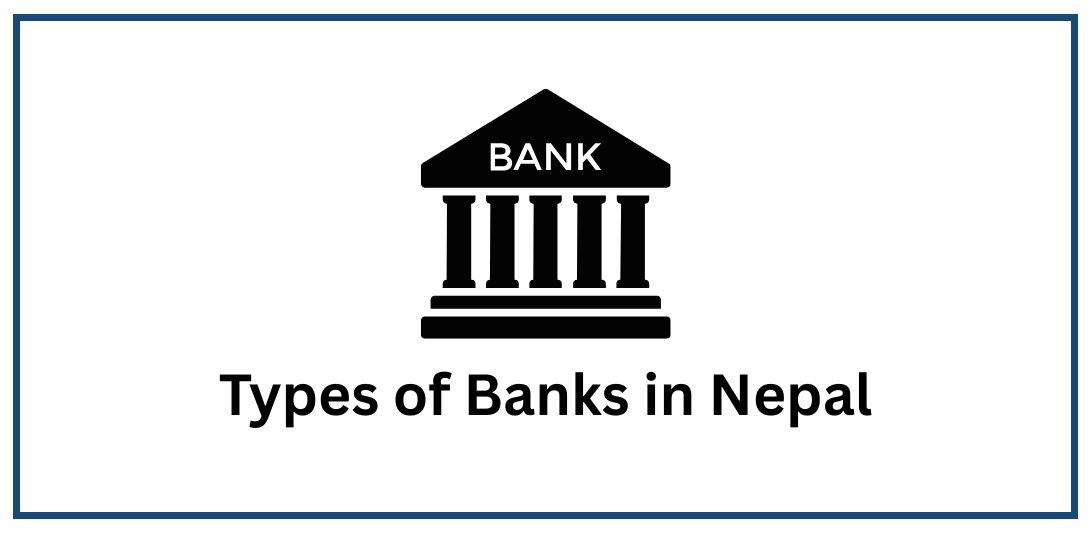
A bank is a financial institution that accepts deposits from the public, provides loans, and offers various financial services like savings accounts, checking accounts, credit cards, and investment products. In Nepal, there are over 50 licensed banks and financial institutions that offer both online and physical banking services, playing a vital role in the country’s economic growth.
Types of Banks in Nepal
1. Class ‘A’ – Commercial Banks
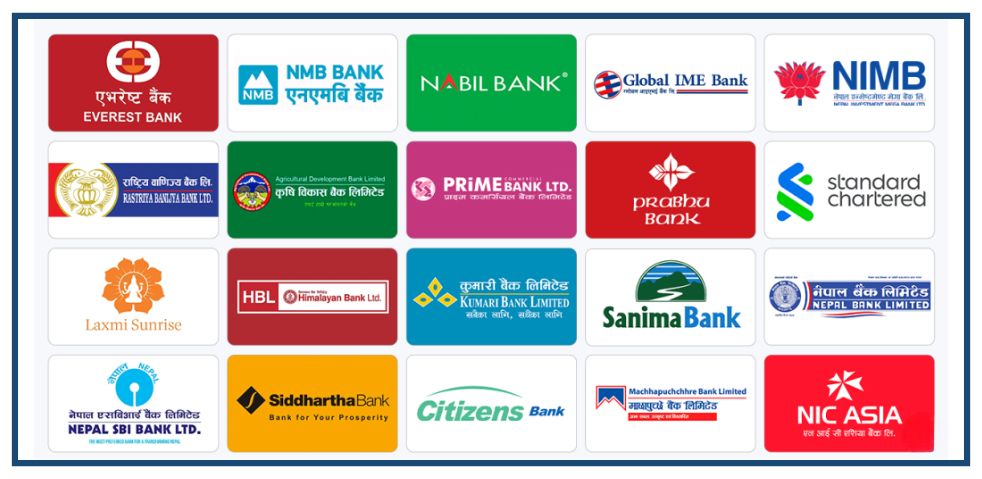
Commercial banks are the largest and most established types of banks in Nepal. They offer a wide range of services, including savings and current accounts, loans, remittances, and trade finance. These banks primarily cater to businesses and high-net-worth individuals. These banks are required to have at least Rs. 8 billion in paid-up capital to operate, as set by the regulatory guidelines. As of July 2022, there were 20 commercial banks in Nepal.
Examples:
- Nepal Bank Limited
- Rastriya Banijya Bank
- Nabil Bank
- Standard Chartered Bank Nepal
2. Class ‘B’ – Development Banks
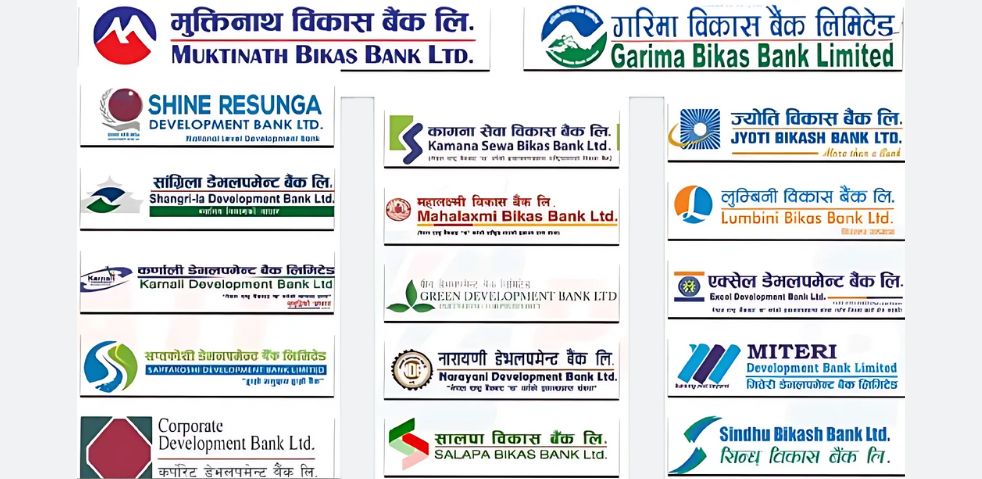
Development banks in Nepal primarily focus on supporting sectors like agriculture, tourism, and small to medium-sized enterprises (SMEs). They are classified based on the area they serve: National level, 4 to 10 districts, or just 1 to 3 districts. As of January 2023, 17 development banks are operating across the country. These banks are required to have at least Rs. 2.5 billion in paid-up capital to operate, as set by the regulatory guidelines.
Examples:
- Muktinath Bikas Bank
- Garima Bikas Bank
- Jyoti Bikas Bank
- Shine Resunga Development Bank
3. Class ‘C’ – Finance Companies
Finance companies offer limited banking services compared to commercial banks. They specialize in areas like vehicle financing, housing loans, hire purchase financing, and personal loans. These institutions primarily serve the urban middle class and businesses. As of 2025, there were 17 finance companies in Nepal. Among them, 15 are operational, while 2 have been classified as problematic. These banks are required to have at least Rs. 800 million in paid-up capital to operate, as set by the regulatory guidelines.
Examples:
- Everest Finance
- Progressive Finance
- Goodwill Finance
4. Class ‘D’ – Microfinance Financial Institutions
Microfinance institutions aim to provide financial services to low-income individuals and groups, especially in rural areas. They offer small savings and credit products to support microenterprises. While their interest rates might be higher, they ensure easy accessibility. As of December 2024, there are a total of 52 microfinance companies in Nepal. Out of these, 51 are currently in operation, while one has been suspended. These banks are required to have at least Rs. 500 million in paid-up capital to operate, as set by the regulatory guidelines.
Examples:
- Swabalamban Laghubitta Bikas Bank
- Nerude Laghubitta Bikas Bank
- Chhimek Laghubitta Bikas Bank
5. Infrastructure Development Bank
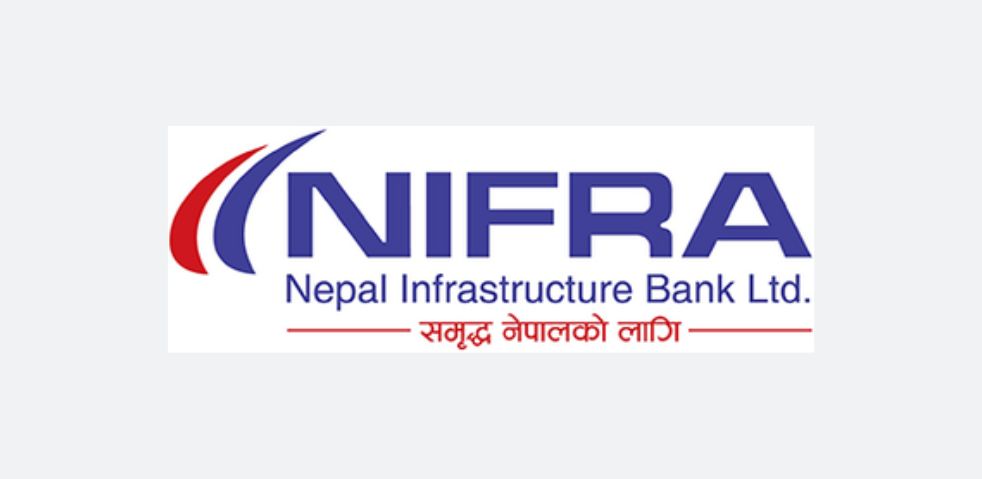
Nepal Infrastructure Bank Limited (NIFRA), established in 2018, is a public company focused on financing sustainable infrastructure projects across Nepal. Its ownership includes the Nepal Government (10%), private investors (10%), public companies (40%), and the general public (40%).
As a specialized financial institution, NIFRA plays a key role in funding large-scale infrastructure projects that support national development. It is the only bank in Nepal dedicated to financing sectors like energy, roads, airports, and telecommunications.
6. Other Financial Institutions
In addition to the primary types of banks, Nepal’s financial system also includes various other institutions that contribute significantly. These include cooperatives and specialized entities such as the Citizen Investment Trust (CIT) and Employees Provident Fund (EPF), among others.
The financial landscape features:
- Insurance Companies: 19 life insurance and 19 non-life insurance companies.
- Reinsurance Companies: 2 companies offering reinsurance services.
- Provident and Investment Funds: Employees Provident Fund (EPF), Citizen Investment Trust (CIT), and Social Security Fund (SSF).
- Specialized Investment Companies: Hydroelectricity Investment and Development Company Ltd. (HIDCL).
- Others: 10 hire purchase companies and a postal savings bank.
These institutions offer a range of services that complement the roles of commercial, development, and microfinance banks, helping to diversify Nepal’s financial sector and meet the diverse needs of the population.
History of Banking System in Nepal
The banking history of Nepal started with the formation of the Nepal Bank Limited in 1937 A.D. (1994 B.S.). It was the first commercial bank to be established jointly owned by the government and the public. Later, in 1956 A.D. (2013 B.S.), Nepal Rastra Bank was set up as the central bank to manage and supervise the country’s banking system. After the 1990s, economic liberalization encouraged the growth of private commercial banks, development banks, finance companies, and microfinance institutions.
In recent years, the banking sector has improved a lot with the introduction of digital services like mobile banking, internet banking, and QR payments, making banking easier to access throughout the country.
Key Challenges in Nepal’s Banking Sector
While growing, the banking system also faces issues like:
- Liquidity shortages – Due to high loan disbursement without matching deposits
- Loan defaults – Especially in sectors hit by economic downturns
- Political instability, which affects investor confidence and regulatory decisions
- Over-competition – Leading to aggressive marketing and reduced profit margins
Conclusion
Nepal’s banking system has grown significantly, moving from just one state-owned bank to a diverse and modern financial sector. It now includes microfinance, mobile banking, and digital services, making finance more accessible. Different banks and financial institutions serve various needs, from rural individuals to big businesses and government projects. They offer loans, savings, and financial advice, helping people and the economy grow. The Nepal Rastra Bank oversees all these institutions to keep the financial system safe and stable.
FAQs About Banks in Nepal
- How many banks are there in Nepal?
As of now, there are 20+ commercial banks and over 50 other financial institutions licensed by the NRB. - Can foreigners open a bank account in Nepal?
Yes. Expats can open accounts with proper identification and visa/residency documents. - Which bank offers the best interest rates in Nepal?
Rates vary. Check the websites of commercial banks like NIC Asia or Nabil for updated rates. - Which is the oldest bank in Nepal?
Nepal Bank Limited, established in 1937, is the first and oldest bank in Nepal.
Blogs
Chhyangdi Hydropower Extends Deadline for Rights Share Application | Until 27th Ashad
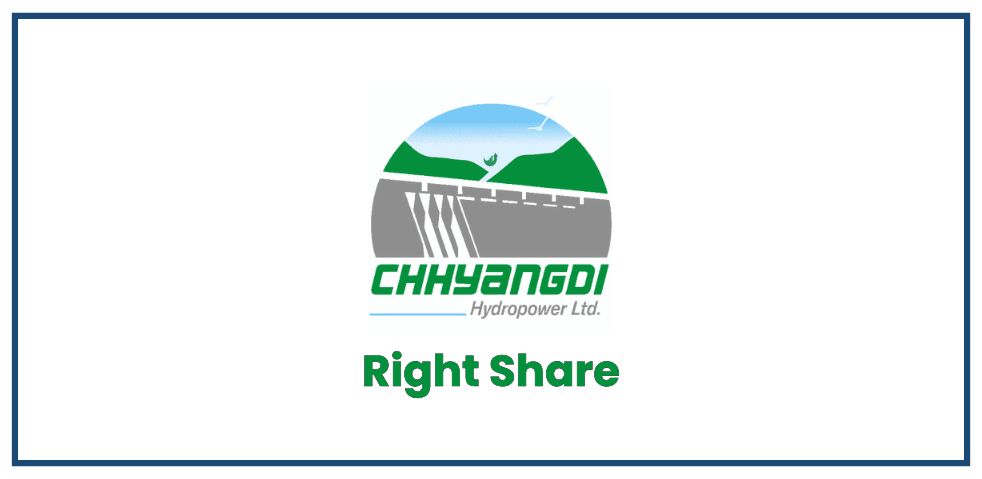
The deadline for the ongoing rights share issue of Chhyangdi Hydropower Limited (CHL) has been officially extended until 27th Ashad, 2082. The issue had originally opened on 23rd Jestha, 2082, with an earlier closing date set for 12th Ashad, 2082.
Key Details of the Rights Share Issue
| Details | Information |
|---|---|
| Total Right Shares Issued | 3,869,775 units (1:1 ratio) |
| Face Value per Share | Rs. 100 |
| Total Issue Amount | Rs. 38.69 Crore |
| Current Paid-up Capital | Rs. 38.69 Crore |
| Post-Issue Paid-up Capital | Rs. 77.39 Crore |
As per the Central Depository System and Clearing Limited (CDSC), 23,503 applicants have applied for 2,317,902 units (worth Rs. 23.17 Crore) as of yesterday.
Eligibility and Application Process
Only those shareholders who held shares before the book closure date of 2nd Jestha, 2082, are eligible for this right share offering.
Interested shareholders can apply through:
- Global IME Capital Limited, Naxal, Kathmandu (Issue Manager)
- Designated branches of Global IME Bank Limited across Lamjung, including Besisahar, Sundarbazar, Bhulbhule, Siundibar, Udipur, and Dordhi
- Any C-ASBA-approved banks and financial institutions
- Online via “MeroShare”.
Applicants are advised to complete the process before banking hours on 27th Ashad, 2082 (Friday).
Important Note:
Payments must be made through an account payee cheque drawn in the name “GICL-BOK-CHHYANGDI RIGHT SHARE”, as per the instructions from Global IME Capital Ltd.
Contact Information
- Chhyangdi Hydropower Ltd
Phone: 977-01-4526483 / 4524925
Email: [email protected] | Website: www.chpl.com.np - Global IME Capital Ltd (Issue Manager)
Phone: 977-01-5970138
Email: [email protected] | Website: www.globalimecapital.com
Notice: Chhyangdi Hydropower Extends Deadline for Rights Share Application
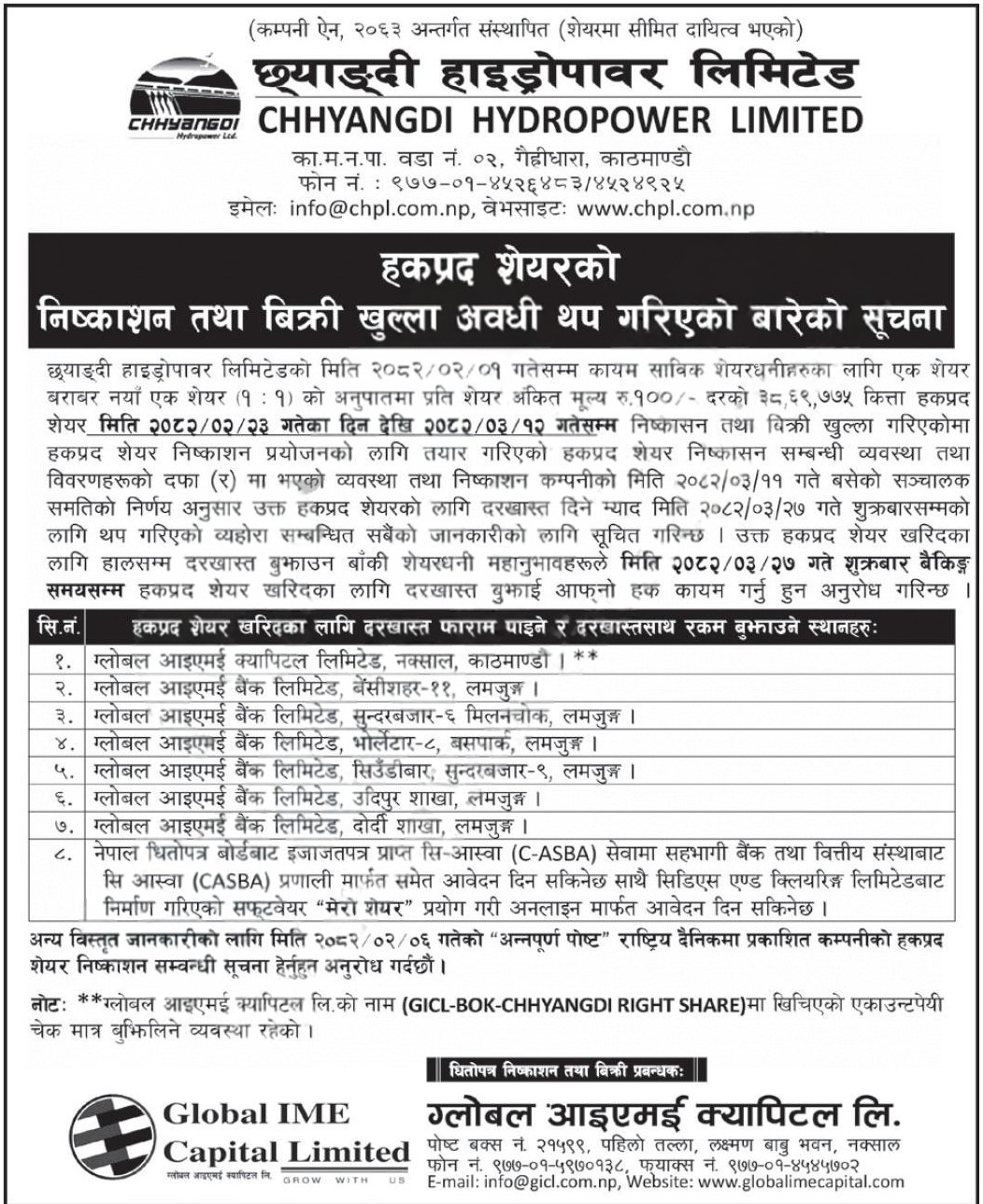
Blogs
Election Commission Preparing to Announce By-Election Date | Voter Registration Now Open
The Election Commission of Nepal has begun preparations for by-elections to fill vacant positions at various levels of government. As part of this process, the Commission is urging all eligible Nepali citizens who have not yet registered their names in the voter list to do so immediately.
According to the Assistant Spokesperson of the Election Commission, Mr. Durga Prasad Chalise, individuals will not be allowed to register in the voter list once the election date is officially announced. Therefore, he emphasized the importance of early registration to avoid being left out.
The Election Commission recently held discussions with the Prime Minister, Mr. KP Sharma Oli, and the Acting Chief Election Commissioner, Mr. Ram Prasad Bhandari. They talked about setting a date for the by-elections. The main focus was on two key areas: Rupandehi Constituency No. 3 for the House of Representatives and Manang Province Assembly Constituency No. 1 (B). Elections in these regions are likely to be held in the second week of Kartik.
The position in Rupandehi became vacant after the passing of Rastriya Prajatantra Party MP Deepak Bohora. In Manang, the seat became empty after provincial assembly member Deepak Manange was sent to jail. In addition to these, more than a dozen ward chairman positions are also currently unoccupied in various local governments.
The Election Commission has issued a public notice dated 2082/03/11 (Nepali calendar) urging all citizens to register in the voter list immediately. The notice mentions that, according to Clause 4(2)(2) of the Voter List Act, 2073, voter registration will be stopped as soon as the election date is declared.
Hence, this is a final chance for anyone who missed earlier opportunities to register. The Commission has made a heartfelt appeal to all brothers and sisters across the country to take this opportunity seriously and get their names included in the voter list.
The Election Commission assures that the upcoming elections will be conducted fairly and freely, in line with its guiding principle:
“Free and Fair Election: Pride of the Nation.”
For more information or assistance, people can visit the official website of the Election Commission at www.election.gov.np or contact their office at Kantipath, Kathmandu.
Notice: Election Commission Preparing to Announce By-Election Date
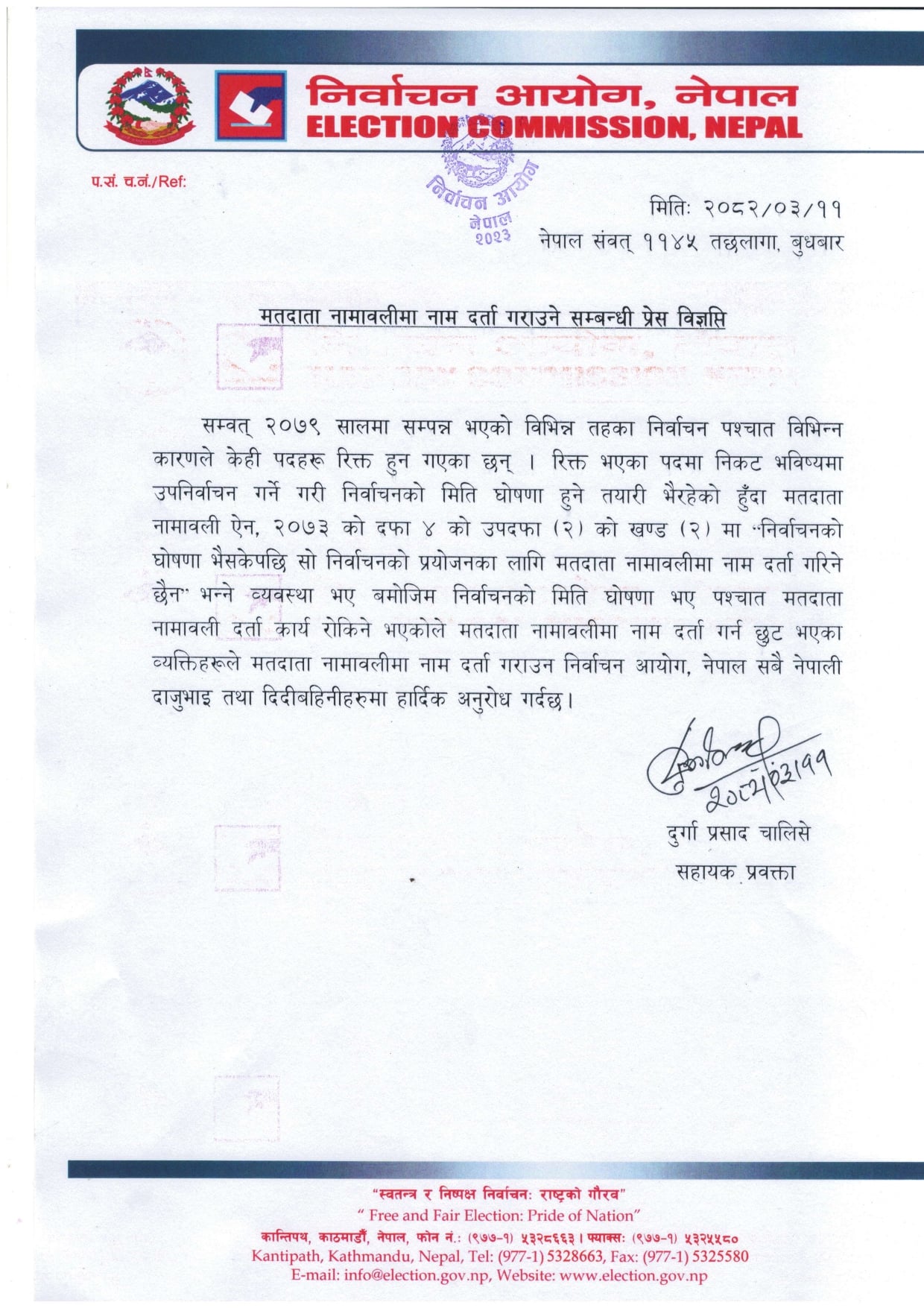
Blogs
Birgunj Customs Office Collects Highest Revenue from Petroleum Imports

The Birgunj Customs Office has collected the highest revenue from the import of petroleum products in the first 11 months of the current fiscal year 2081/82. According to the office, a total of NPR 73.18 billion was collected in revenue from petroleum imports alone.
During this period, Nepal spent about NPR 174.09 billion to import five different types of petroleum products. These petroleum imports contributed 46.43% of the total revenue collected from the top 20 imported items, making it the most important source of income for the customs office.
Major Revenue Contributors from Imports

What Officials Say
Customs Chief Administrator Deepak Lamichhane stated that petroleum products and vehicle imports are the main sources of customs revenue at Birgunj. He highlighted that these two sectors consistently contribute the highest share of government income collected through imports.
Conclusion
The data from the Birgunj Customs Office shows that fuel and vehicles remain Nepal’s most heavily imported and taxed items. With more than 46% of the revenue coming from petroleum alone, any changes in fuel prices or import volumes can significantly affect national customs revenue.
-
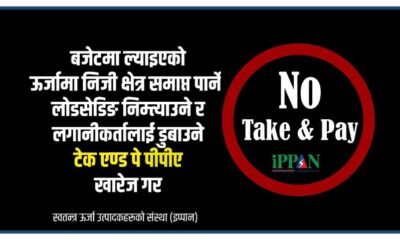
 Blogs5 days ago
Blogs5 days agoPrivate Power Producers Protest ‘Take and Pay’ Provision in Budget
-
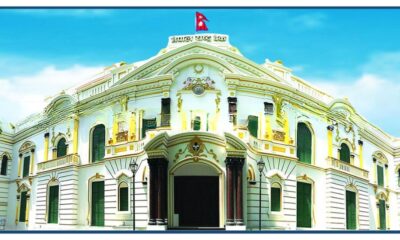
 Blogs5 days ago
Blogs5 days agoNepal Rastra Bank to Withdraw NPR 60 Billion from the Banking System on Monday
-

 Blogs1 year ago
Blogs1 year agoList of Stock Brokers in Nepal with NEPSE TMS Login – Updated
-

 Blogs1 week ago
Blogs1 week agoHydropower Gains 7.8% in One Month, Outperforming All Sectors
-

 Blogs5 days ago
Blogs5 days agoAsian Life Insurance to Issue Rights Shares from Asar 25
-

 Blogs3 months ago
Blogs3 months agoPure Energy IPO For General Public
-

 Blogs5 days ago
Blogs5 days ago52-Week Low & High Microfinance Shares in Nepal: Current Status and Future Outlook
-

 Blogs1 week ago
Blogs1 week agoBanks Invest Rs. 16.45 Trillion in Directed Loans, 14% in Agriculture Sector | Says Nepal Rastra Bank




